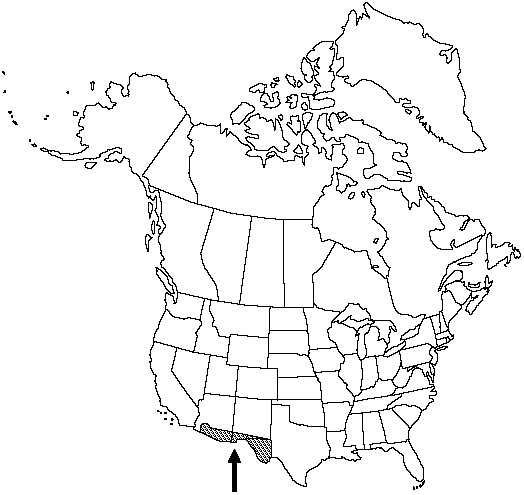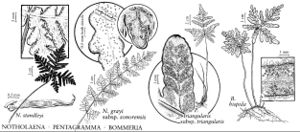Bommeria hispida
Bull. Torrey Bot. Club 29: 633. 1902.
Stems long-creeping and often branched. Leaves arising at 7–10 mm intervals. Petiole generally rounded (but distally grooved in some large leaves); indument of scales proximally, of scales and trichomes distally, central portion generally glabrous. Blade 1–7 cm, about as long as wide; ultimate segments rounded at apex; abaxial indument of scales (commonly with 10+ cells across base), unicellular needlelike trichomes (0.75–1.12 mm), and unicellular coiled trichomes (ca. 1–2 mm); adaxial indument of unicellular needlelike hairs 0.47–1.11 mm, arising from unspecialized basal-cells; rachis chestnut-brown. Veins free. Sporangia covering 2/3–3/4 distance from margin of blade to costa of each ultimate segment. Spores 64 per sporangium; perispore surface crested. 2n = 60.
Phenology: Sporulating summer–fall.
Habitat: At bases of large boulders on dry to moist slopes, primarily in mountainous, xeric regions, occasionally forming large mats
Elevation: 1000–2500 m
Distribution

Ariz., N.Mex., Tex., Mexico
Discussion
Bommeria hispida is the only member of this genus to occur north of Mexico. It is the most morphologically distinct species in the genus, having a relatively small leaf size, dissected segments, and copious and diverse leaf indument. Natural hybrids involving B. hispida are unknown. The pedate blade shape, lack of colored farina abaxially, and presence of both needlelike and coiled trichomes abaxially serve to distinguish this species from sympatric members of Cheilanthes, Notholaena, and Pentagramma.
Reports of Bommeria hispida in California (C. H. Haufler 1979) are based on old specimens with questionable locality data.
Selected References
None.
Lower Taxa
"wide" is not a number.
